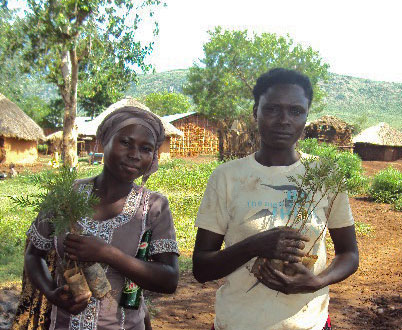March 8th is International Women’s Day. This year, the United Nations has declared the theme, “Equal Rights, Equal Opportunities: Progress for All.” Unfortunately it takes much more than a catchy slogan to realize such high ideals. Fortunately, women everywhere are fighting for those rights and opportunities. We’re thrilled to be able to help.

Women and the Environment
In every corner of every country, women’s health is jeopardized both by physical and social realities, including child birth, sexual violence, gender discrimination, and domestic responsibility, just to name a few.
In addition to these well-known risks, there are many environmental exposures that are especially hazardous to women’s health in developing countries. Women are the first to go without food if there is a shortage. Women walk farther for water in the event of a drought. Women are fourteen times more likely to die after a natural disaster. Women breathe polluted air as they cook for their families. Women are more vulnerable to toxins during pregnancy. The list goes on and on.
Our Approach
In recognition of these connections between women’s wellbeing and environmental degradation, Global Greengrants Fund has prioritized grantmaking with a gender lens. It’s an obvious and effective strategy.
Propagating change from the ground up begins more and more often with women. Environmental sustainability and social justice are intricately tied to the involvement of the women these ideals affect.
As one grantee described, “In many regions, migration has left households in the hands of women with the strength, desire, and need for adequate work.” Following any small amount of economic success, women are more likely to invest in their families, in the health of their children, in the stewardship of their environments. As a result, the wellbeing of women translates to the wellbeing of entire communities.
As with everything we do, integrating a gender-approach into our funding begins with local buy-in and leadership. Historically, while our grants have always benefited women in some way, they had rarely targeted women as a specific grantmaking strategy. In the past three years, Global Greengrants Fund has prioritized the relationship between women and the environment and targeted gender-specific initiatives.
The Gendered Grantmaking Continuum
Global Greengrants’ funding is now measured against the “gendered grantmaking continuum” to evaluate our impact on women’s wellbeing.
At one end of the spectrum, grants that do not reinforce existing gender inequalities are considered gender-neutral. According to Executive Director Terry Odendahl, “most of Global Greengrants’ funding falls into this category.”
In the middle of the spectrum, gender-positive funding can empower women to decrease inequalities. As Global Greengrants Fund moves in that direction, we are proud that in places like Russia as much as 70% of our grants are made to women-led organizations. Still, we are constantly looking for ways to more profoundly impact the wellbeing of women and the environment. Gender-justice funding – at the other end of the spectrum – restructures social systems to change gender relations in a community. It presents just such an opportunity for impact.
Supporting Women as Environmental Leaders
Global Greengrants’ gender-lens approach to grantmaking has seen some impressive results. We have helped female doctors improve health in remote Russian settlements, empowered Indian women to make informed production and consumption choices, and funded Nicaraguan entrepreneurs to support female-owned businesses.
It’s an approach that we’re proud to embrace. As Terry reminds us, “Where women are doing well, so is the environment; where the environment is healthy, women’s, men’s and children’s lives are better.”
This International Women’s Day, we’re excited to be contributing to just that!
For more on Global Greengrants Fund’s gender-approach to grantmaking, read Executive Director Terry Odendahl’s recent article in Alliance Magazine.
For more on our gender-specific work, download our focus piece on women.
